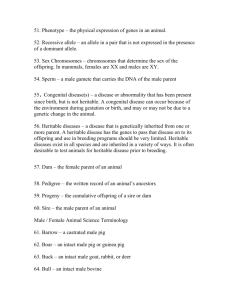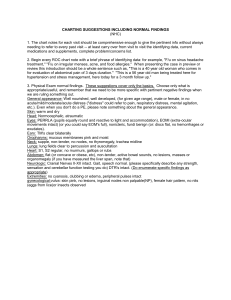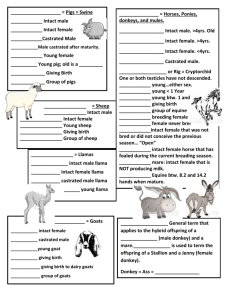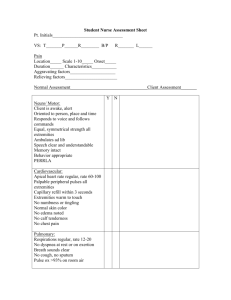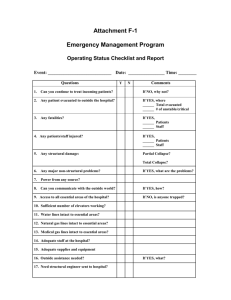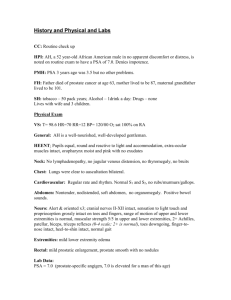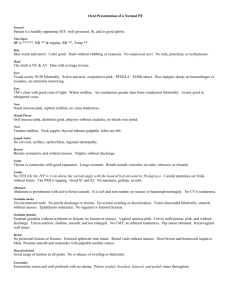Anatomy & Physiology Introduction and Terminology
advertisement
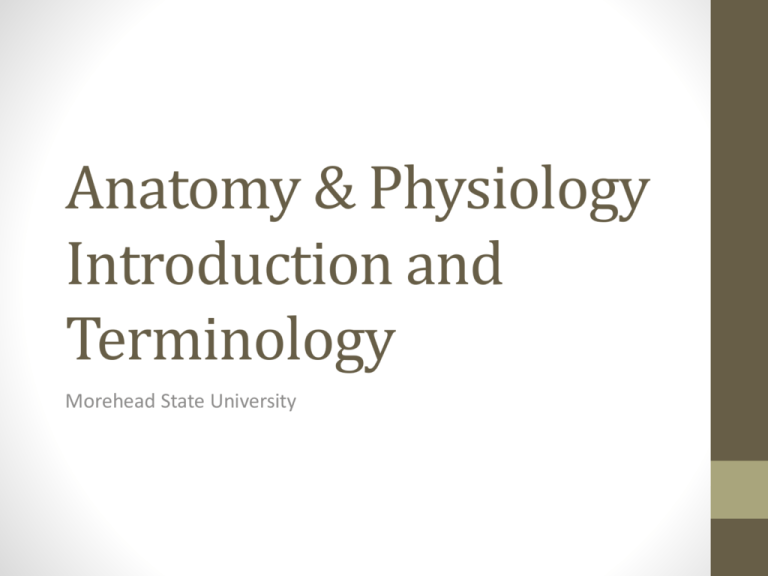
Anatomy & Physiology Introduction and Terminology Morehead State University Definitions • Anatomy • Science that deals with the form and structure of all organisms • Physiology • Study of integrated functions of the body and the functions of all its parts • Systems, organs, tissues, cells, cell components • Gross Anatomy • Study of organs, parts, and structures that are visible with the unaided eye • Also called macroscopic anatomy • Comparative Anatomy • Study of structures of various species of animals with emphasis on those characteristics that aid in classification • Embryology • Study of the developmental anatomy, covering the period from conception (fertilization of the egg) to birth • Microscopic Anatomy (histology) • Study of tissues and cells that can only be seen with the aid of a microscope Nomenclature for Systematic Anatomy System Name of Study Chief Structures Skeletal Osteology Bones Aritcular Arthrology Joints Muscular Myology Muscles Digestive Splanchnology Stomach and Intestines Respiratory Splanchnology Lungs and airways Urinary Splanchnology Kidneys and urinary bladder Reproductive Splanchnology Ovaries and testes Endocrine Endocrinolgy Ductless Glands Nervous Neurology Brain, spinal cord, nerves Circulatory Cardiology Heart and vessels Sensory Esthesiology Eye and ear Anatomy of Terms • Prefix • Beginning of word • Usually indicates #, location, time, or status • Root • Essential meaning of word • Combining Vowel • Single vowel added to end of word, usually to make the word easier to pronounce • Combining form • Root and combining vowel • Suffix • End of word • Usually indicates procedure, condition, disease, or disorder Prefix • Added to root of a word to modify the meaning • Pre• Before • Ex. Preoperative (before an operation) • Peri• Around • Ex. Perioperative (pertains to the period surrounding an operation; either before, during or after) • Post• After • Ex. Postoperative (after operation) Combining Vowel • Added to make a medical term easier to pronounce • Used when suffix begins with a consonant • i.e. –scope (arthroscope=examines the joint) • “O” is most common, but “I, E” is also used • Not used when suffix begins with vowel • i.e. –it is (gastritis=inflammation of stomach) • ALWAYS used when 2+ root words are joined • Gastr/o (stomach) joined with enter/o (small intestine) • =gastroenteritis • NOT used between prefix and root words Combining Forms • Root word + combining vowel • Usually used to describe a part of the body • Creates new words when added to prefixes, other combining forms, and suffixes • Ex. Panleukopenia • Pan• prefix meaning all • Leuk/o • Combining form meaning white (root word and combining vowel) • -penia • A suffix meaning deficiency or reduction in number • Panleukopenia then means a deficiency in all white blood cells Suffixes • Attached to the end of a word part to modify its meaning • Ex. Combining form gastr/o means stomach • Modifications: • -tomy – cutting into or incision (gastrotomy=incision into the stomach) • -stomy – surgically created opening (gastrostomy=surgically created opening between stomach and body surface) • -ectomy – surgical removal or excision (gastrectomy=surgical removal of the stomach) Analyzing Medical Terminology • Dissect • Look at the word structure and divide it into basic components • Begin at the END • After dividing the word: • Define the suffix • Define the prefix • Define the roots • If two, divide and read left to right • Examples: • Gastroenteritis • gastr/o – • enter – • itis- • Overiohysterectomy • ovario/o• hyster • -ectomy A B D E C F E D Positional Terms • Cranial • Towards the head • Caudal • Towards the tail • Ventral • Belly or underside or a body or body part • Dorsal • Back • Front of leg/paw • Rostral • Nose end of head • Proximal • Nearest the mid-line or nearest the beginning of a structure • Distal • Farthest from mid-line or farthest from the beginning of a structure More Positional Terms • Anterior • Front of the body • Used more in description of organs or body parts because front and rear are confusing terms in quadrupeds as their bellies are down not in front like in humans • Posterior • Rear of the body • Medial • Towards the midline • Lateral • Away from the midline • Superior • Uppermost, above, or towards the head. Used most commonly in bipeds • Inferior • Lowermost, below or towards the tail. Used most commonly in bipeds One More Positional… • Superficial • Near the surface • Also called external • Deep • Away from the surface • Also called internal • Palmar (A) • Planter (B) • Caudal surface of the paw (rear paw) including the tarsus • Means sole of foot in Latin • Basically means back of foot /paw in rear limb • Caudal surface of the manus (front paw) including the carpus • Means hollow of hand in Latin • Basically, back legs/paws in front legs A B Plainer Terms Plainer Terms • Median Plane • Divides the body into EQUAL left and right halves • Sagittal Plane • Parallel to median plane but doesn’t divide the body into equal parts • Transverse Plane • At right angles to the median plane and divides body into cranial and caudal segments • Cross-section of body would be on transverse plane • Ex. Cinch on a saddle • Horizontal Plane • At right angles to both median and transverse planes • Divides body into dorsal and ventral segments • Ex. Cow walks into water up to chest…the water surface is a horizontal plane in relation to the cow Species Terminology • Canine (Dog) • Dog/stud • Intact male dog • Bitch • Intact female dog • Whelp (pup) • Young dog • Whelping • Giving birth to whelps • Pack • Group of dogs • Litter • Multiple offspring born during same labor • Feline (Cat) • Tom • Intact male cat • Queen • Intact female cat • Kitten • Young cat • Queening • Giving birth to kittens • Psittacine (parrots and other birds with seed cracking bills) • Lagomorph (Rabbits) • Buck • Intact male rabbit • Doe • Intact female rabbit • Lapin • Neutered male rabbit • Murine (mice and rats) • Sire • Intact male mouse or rat • Dam • Intact female mouse or rat • Pup • Young mouse or rat • Chickens (poultry) • Rooster • Sexually mature male chicken (also called a cock) • Hen • Intact female chicken • Poult • Young chicken • Chick • Very young chicken • Flock • Group of chickens • Porcine – Swine (pigs) • Boar • Intact male pig • Sow • Intact female pig • Barrow • Male pig castrated when young • Stag • Male pig castrated after maturity • Gilt • Young female pig that has not farrowed • Pig or piglet • Young pig; old term is shoat • Farrowing • Giving birth to pigs • Herd • Group of pigs • Equine (horses, ponies) • Stallion • Intact male > 4 yrs old • Mare • Intact female > 4 yrs old • Filly • Intact female <4 yrs old • Gelding • Castrated male • Foal • Young equine (either sex) • Weanling • Young equine < 1 yr old • Foaling • Giving birth to equine • Herd • Group of equine • Band • Group of horses consisting of one mature stallion and female offspring of his mares • Brood Mare • Breeding female • Maiden mare • Female equine never bred • Barren mare (open mare) • Intact female not bred or didn’t conceive previous season • Donkey/ Burro • Jack • Intact male donkey • Jenny • Intact female donkey • Caprine (Goat) • Buck • Intact male • Doe • Intact female • Wether • Castrated male • Kid • Young goat • Kidding • Giving birth to goats • Herd • Group of goats • Ovine (sheep) • Ram • Intact male • Ewe • Intact female • Wether • Castrated male • Lamb • Young sheep • Lambing • Giving birth to sheep • Flock • Group of sheep • Camelid (llamas, alpacas) • Cavey (guinea pigs) • Bovine (Cattle) • Bull • Intact male • Cow • Intact female that has given birth • Heifer • Young female that has never given birth • Steer • Male castrated when young • Calf • Offspring Classification of Animals Domestic Animals Animal • Genus • (upper case) • Species • (lowercase) Species Name Horse (equine) Equus caballus Ox (bovine) Bos taurus (european) Bos indicus (indian / brahma) Goat (caprine) Capra hircus Sheep (ovine) Ovis aries Pig (swine) Sus scrofa domestica Cat (feline) Felis catus Dog (canine) Canis familaris Classifying Animals with hooves • Ungulate (means hoof) • • • • • Horse Ox Goat Sheep Pig • Number of Toes • Artiodactyla (even # toes) • • • • Ox Goat Sheep Pig • Perissodactyla (odd # toes) • horse Classifying Based on Digestive Systems • Carnivores • Dog • Cat • Herbivores • Ruminants • Ox • Goat • Sheep • Non-Ruminants • Horse • Rabbit • Omnivore • Pig • Monogastric
